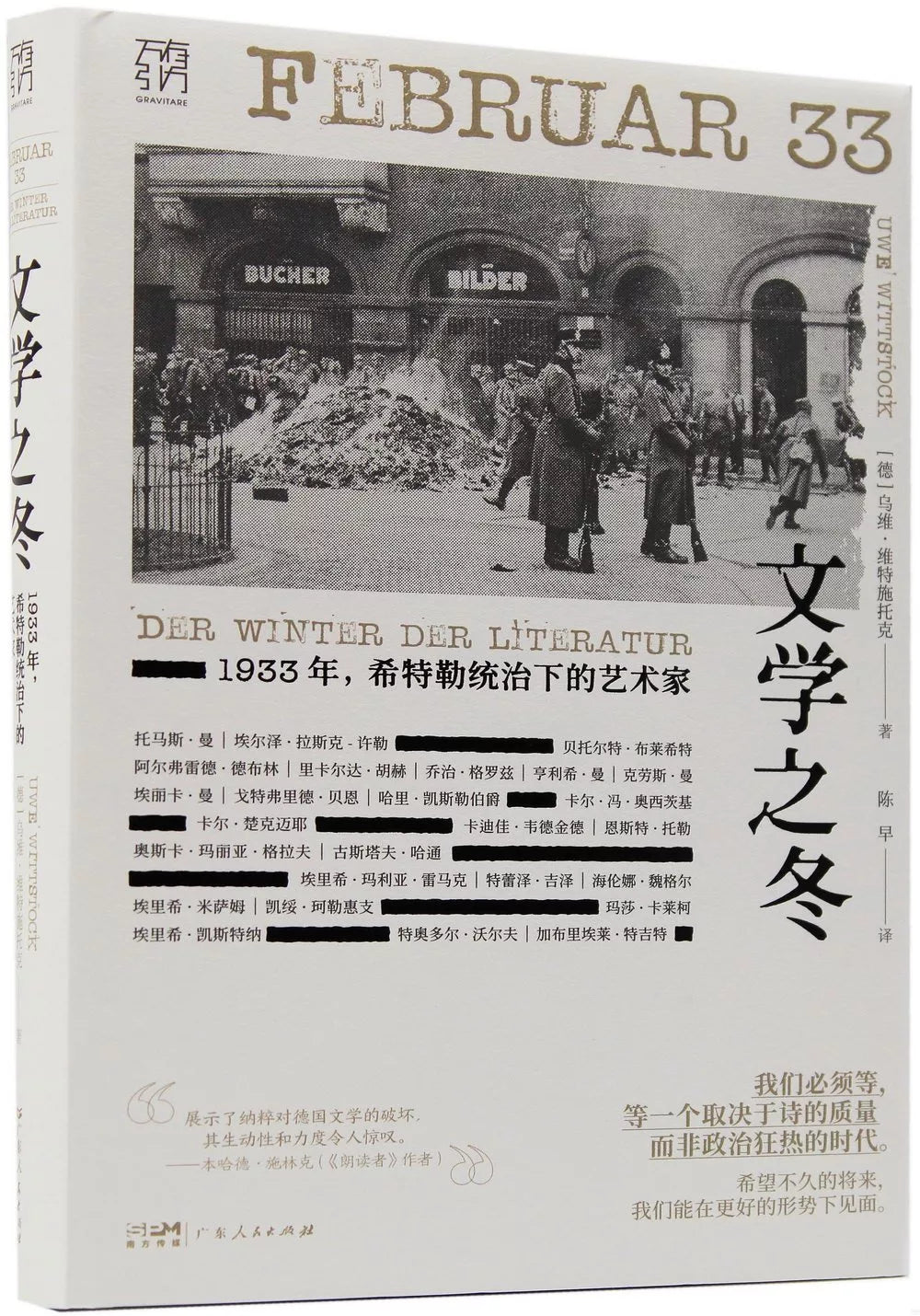1
/
of
1
Literary Winter
Literary Winter
[Germany] Uwe Wittstock Chen Zao 译
Regular price
$23.99 USD
Regular price
Sale price
$23.99 USD
Unit price
/
per
Low stock
Couldn't load pickup availability
About Book
About Book
February 33: Der Winter der Literatur
We must wait, wait for an era that depends on the quality of poetry rather than political fanaticism.★For those who want to speak but cannot ★For those who are in the midst of drastic changes and don’t know where the waves are going————————
[This book has been praised]
🌟2024 Sanlian Book Award·Literary Translation Award;
🌟2023 New Weekly Blade Book Award Book of the Year;
🌟Ranked on Douban's weekly popular list of historical and cultural books for 10 consecutive weeks;
🌟Recommended by Liang Wendao, Zhao Dongmei, Zhi'an, Lu Dapeng, Ma Ling, Fan Ye, Hu Sang, Zhou Jianing, Zhu Yujie, etc. 🌟Selected as the recommended books of 2023 by Phoenix Reading and the public reading list;
🌟Selected for the January list of the 3rd Sanlian Life Weekly Xingdu Book Award;
🌟Selected for the January 2024 new book monthly list of Beijing News Book Review Weekly.
————————
【Expert Recommendation】
This is not an isolated book; it joins a network that connects my existing reading experience and keeps me pursuing it.
——Liang Wendao recorded day by day those real events that are still horrifying to read today. They are very specific and full of details. People did not have the understanding that they could have later, but only the confused thoughts and dangerous fate at that time.
—Zhi'an Facing the changing times, choices are so difficult. It's incredibly difficult for those involved to judge when things truly turn bad. Therefore, ordinary people who may not be able to see through the fog of history's trajectory but still make dignified choices are particularly worthy of respect.
—Fan Ye (renowned translator, judge of the Sanlian Life Weekly Reading Book Award)
Civilization doesn't always move forward; when it collapses, it's faster and more violent than one might imagine. This book doesn't dwell on details; it simply writes down the days, with a "Daily News" section at the end. This alone is enough to chill you to the bone, to feel the chilling reality that nonfiction can offer over fiction.
—Ma Ling (Senior book reviewer, Professor at the School of Journalism, Fudan University)
This is an outstanding group biography and a brilliant ukiyo-e painting. The rich and colorful modern literature of the Weimar period comes to an abrupt end here, which is tragic and lamentable. Those who come after us mourn this but fail to learn from it will only cause those who come after us to mourn us.
——Lu Dapeng (renowned translator and book reviewer)
In just forty days after Hitler came to power, systematic brutality and unrest completely shattered the spirit of individuals. This book, written in the form of a panoramic diary, condenses the fates of more than a dozen elite figures in German literature and art into a single decisive moment. It is believed to be inspiring for creators from all regions and historical periods. The collapse of the spiritual world begins with the collapse of daily life. Once true fear permeates the body, the will to write poetry vanishes.
——Zhou Jianing (writer)
This book aims to recreate the historical scene, showcasing the artists' personal experiences through their diaries and letters, reflecting the experiences of those who attempted to defend the rule of law and democracy. It reveals the transition from bewilderment to ultimate political submission under Nazi oppression, as well as the spiritual and moral degradation suffered by the artists in this process, thus prompting a profound reflection on the choices we make in our own lives and the values of our spiritual lives.
—Zhu Yujie (writer, curator, cultural scholar, and PhD candidate in Art Philosophy at Fudan University)
History often repeats itself with surprising repetitions. Book burning, this ancient dictatorial method common in both China and the West, and the harsh censorship of literature and art can lead writers to self-castrate in the creative process. Reading this book is also inspiring, and even on the coldest night, the light of the spirit still shines. Numerous unforgettable details connect to form a spiritual galaxy of humanity, offering us eternal inspiration.
——Shen Xiayan (Professor of the School of Literature, Jinan University)
Using montage techniques, the film depicts the uncertainty, anxiety, anger, and courage of German intellectuals from late January to mid-March 1933, with perhaps unprecedented detail and vividness. Through these narratives, we return to the breathtakingly tense historical scene, feeling the weight of political destiny and reflecting on the ultimate meaning of human existence and integrity.
——Liu Zheng (Chief Editor of Southern Metropolis Daily)
————————
【Content Introduction】
In February 1933, the will of poetry was defeated by political fanaticism.
After Hitler became Chancellor of Germany, he immediately launched a persecution of communists and social democrats. Writers and artists active in German politics and culture bore the brunt of the persecution. Within a single month of the Nazis' first reign, these writers and artists were imprisoned, executed, or forced to flee the country. This book, with its intimate perspective and meticulous narrative, chronicles the persecution and exodus that unfolded daily from January 28 to March 15, 1933, depicting the experiences of numerous cultural giants of the Weimar era, including Thomas Mann, Elsa Lasker-Schüller, Brecht, Alfred Döblin, Huch, Georg Grosz, and Heinrich Mann. This brief period of just over a month marked the beginning of a winter for German literature and the prelude to a cold night across the world.
Publication Date
Publication Date
2024-01-01
Publisher
Publisher
广东人民出版社
Imprint
Imprint
gravity
Pages
Pages
348
ISBN
ISBN
9787218167367
share

